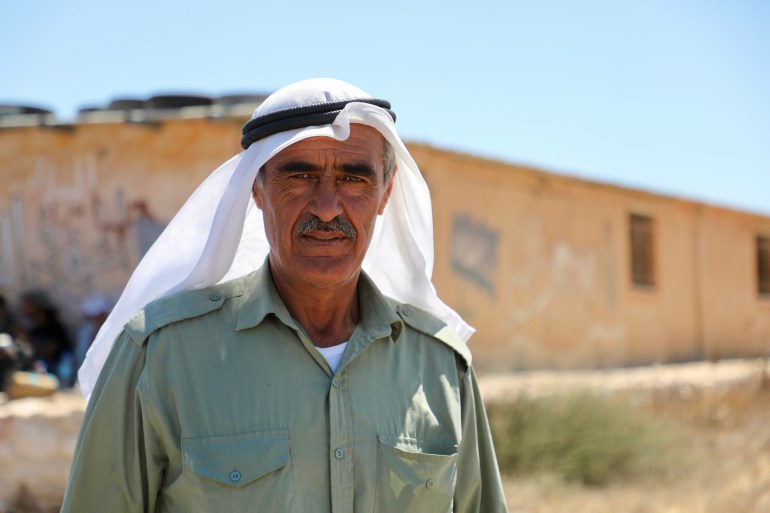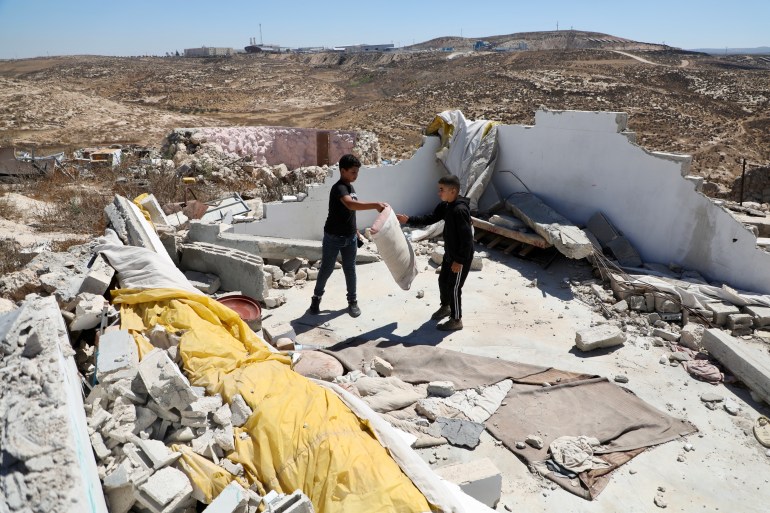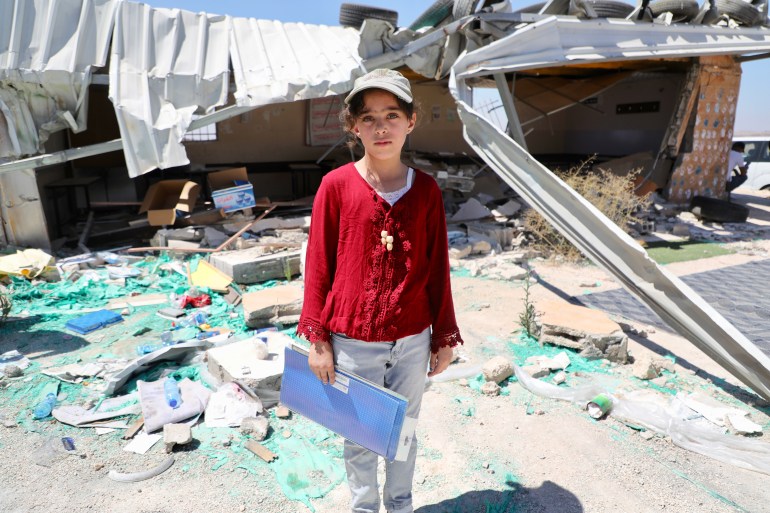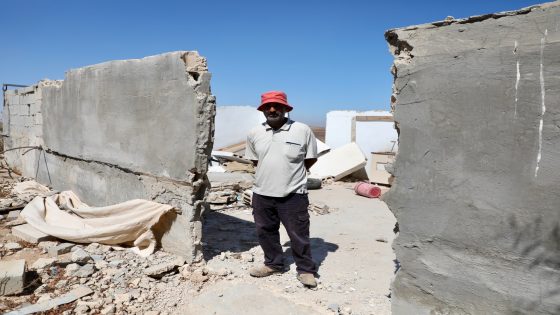Zanuta, occupied West Bank – When the villagers of Zanuta fled their homes last year, chased out by Israeli settler attacks, they took their keys with them.
For the 300 or so days that they spent living in tents in al-Dhaheriya, about 30km (19 miles) away, they kept their keys, in the hope that they would be able to return to their homes.
On August 21, after a legal battle, some villagers did return. But their keys were of no use. Instead, the sight that greeted them was a reminder of the precarious nature of life for Palestinians in the occupied West Bank, particularly in areas under the direct control of Israel.
“When we returned, we thought that we would be happy,” explained Muhammed al-Tal, a 23-year-old villager, whose family has lived in Zanuta for generations. “But we were shocked by the sight of demolished and burned homes and devastation everywhere.”
“We carried the keys to our homes and they remained a sign of hope for us, that we would return,” he said. “We were able to return, but we did not find houses or doors for the keys that we carried.”

Forced out
Zanuta lies about 20km (12 miles) south of Hebron and was home to about 40 families, or about 250 people, before the beginning of Israel’s war on Gaza in October last year, in which Israel has now killed more than 42,000 Palestinians.
This was a community focused on rearing livestock, an ancient way of life and a common one for the Palestinian residents of this part of the West Bank.
But the village and its land have been encroached upon by illegal Israeli settlements for years.
The abandonment of Zanuta was sparked by attacks by violent settlers who living in nearby settlements, including Shim’a, to the east.
These attacks predated the Gaza war, but the conflict has provided cover for an increase in settler attacks throughout the West Bank, several of which have led to Palestinian deaths.
In Zanuta, the settlers were particularly vicious. Muhammed described the “roar of bullets and brutal attacks” that began on October 7, the day the Palestinian group Hamas launched an attack on southern Israel, in which an estimated 1,139 people were killed.
By the end of October, Muhammed and the rest of the residents of Zanuta had left, forcibly displaced.
“They would come secretly at night while we were sleeping,” said 53-year-old Abdelaziz al-Tal, a member of Muhammed’s extended family. “The settlers took the pretext of the war in Gaza to dramatically escalate the attacks until they affected all aspects of life against the Palestinians inside the village. They did not spare a house from demolition and vandalism, not a school, not even a lamp-post.”
When the villagers returned to Zanuta in August, Abdelaziz stood in what used to be his house.
“Here was the kitchen,” he said, standing in the corner of the now-demolished structure. Abdelaziz reminisced about his family’s life in the house, where his wife prepared the food and where his children slept.

The rebuild
Abdelaziz wants to rebuild his home before winter sets in. But while the Israeli court has allowed them to return, they have not had explicit permission to rebuild and have continued to face settler harassment as Israeli forces stand by.
A lawyer for the villagers, Qamar Mashreqi, explained to Al Jazeera that the right of the villagers to rebuild their homes had been delayed because it is not clear whether the Israeli court’s order in July had stipulated that villagers had permission to rebuild their homes, or whether it simply only allowed them to physically return.
Mashreqi said that an effort was ongoing to obtain an order clearly allowing the villagers to rebuild what the settlers had destroyed.
Zanuta’s presence in Masafer Yatta, a region of the southern West Bank home to approximately 2,500 Palestinians, further complicates matters.
Residents of Masafer Yatta have been locked in a years-long battle with the Israeli military, which unilaterally declared the area a closed military “firing zone” for training purposes in the 1980s. Palestinians in Masafer Yatta were expelled by Israel in 1999 on the spurious basis that they were living there illegally, despite their presence in the area prior to Israel’s illegal occupation in 1967.
The expelled residents were allowed to return a few months later, following an interim injunction, but they faced regular home demolitions, even before October 7.
Building permits are notoriously hard to obtain for Palestinians living in Area C of the West Bank – under total Israeli control – and a lack of permits is often used as a pretext for the demolitions.
Fayez al-Tal, the head of Zanuta’s village council, explained that the lack of permissions for the buildings was one of the reasons for the need for a clearer order from the Israeli court to remove the main hurdle preventing the villagers from rebuilding their homes.
“The Israelis prevented Zanuta’s people from doing anything,” Fayez said, commenting on the situation after the villager’s return in August. “[They only allowed us] to be in the lands without building, restoring, or even providing the necessary food for the animals.”

‘Liberated but destroyed’
The villagers of Zanuta have found some support from the Palestinian Liberation Organization (PLO), the United Nations-recognised representative of the Palestinian people.
The PLO’s head of the Colonization and Wall Resistance Commission, Moayad Shaaban, told Al Jazeera that Zanuta was just one of 26 communities in the occupied West Bank where Palestinians had been displaced from since the beginning of the war on Gaza.
“Zanuta has been liberated, but it is completely destroyed, and we will work with instructions from [Palestinian Authority] President Mahmoud Abbas to restore the village as it was before,” Shaaban said. “We will build houses, schools, and mosques, and provide what the residents need so that they can withstand the settlers and the Israeli occupation.”
“We will work in coordination with the legal side in order to work legally so as not to [allow] any repeated attack on the people in the village,” he added. “We will restore Zanuta as it was before the settlers’ war on it.”
Fayez, the head of the village council, was among those doing what they could to make Zanuta more habitable as they wait for a court order allowing a full rebuild.
He spent his time cleaning inside the lesser-damaged buildings and hoped to renovate some classrooms in the school.
But with water and power lines cut, and no permission as of yet to fully restore the destroyed structures, the rebuilding journey has a long way to go.
And in the meantime, the Palestinians of Zanuta are forced to live with no proper shelter, unable to rebuild their homes until Israel gives them permission to do so.
“The people live in the open air,” said Fayez. “Their roof is the sky and their bed is the earth, without a house to shelter them.”





